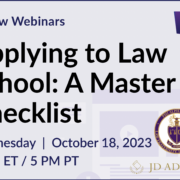The Pros and Cons of Law School Early Decision Programs
The Pros and Cons of Law School Early Decision Programs
The early bird gets the worm, but does it get a law school acceptance letter? For some students, applying to a binding early decision program is the right choice. For others, it is a mistake. To help you decide, we’re breaking down the pros and cons of law school early decision programs.
The Pros and Cons of Law School Early Decision Programs
The Pros of Early Decision Programs
The deadlines for applying to law school early decision programs are in October or November (some very late ones extend into December), with decisions from most programs coming back to students around December. While students waiting on regular admissions decisions may have to wait for several months or longer, one benefit of early decision is that you can begin planning your transition earlier.
Law school early decision programs can also increase your chances of admission. By applying early in the cycle, you’ll compete with fewer applicants. The admissions staff may be more open-minded when reviewing your materials, as they have more seats they need to fill.
There’s one particular type of applicant that should seriously consider early decision programs: if your LSAT/GPA are below median for your dream school. Law school admissions is a numbers game. If you commit to attending a particular school by applying for an early decision, you have a better shot at admission if your numbers are outside their usual range.
The Cons of Early Decision Programs
Applying “early decision” for law school means getting a head start on your application materials. Not only do you need to have your applications, essays, and recommendations finalized by October or November, you’ll also need an LSAT score on file. Generally, the October LSAT is the latest you can use for early decision.
If you’re less sure about where you want to go to law school, a law school early decision option probably isn’t the right choice. Most early decision programs are binding, meaning that you will be required to withdraw your applications to other schools upon acceptance. Early decision programs are also less likely to allow you to defer for a year. If flexibility is something you want when weighing your law school options, early decision options may not be the best choice for you.
Another disadvantage of applying early admission to law school is that it can impact your financial aid. Because the school knows you are already committed to attending, they’re less likely to offer you merit-based aid. However, if you were already a reach candidate, you were unlikely to receive a scholarship anyway. If you’re concerned about scholarships or financial aid, check out these 8 must-know scholarship tips before you begin the application process!
If you are thinking about applying to a law school early decision program, consider the factors listed above. Only you know what’s best for your law school career!
Pursuing Law School? We’ve Got You Covered!
🌟 Special Offer: Enroll in our FREE on-demand law school prep course, meticulously crafted by a top-ranked law student. Secure your spot now








Leave a Reply
Want to join the discussion?Feel free to contribute!